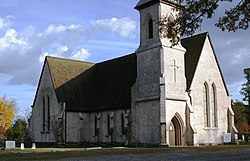Church of the Holy Cross (Stateburg, South Carolina)
Church of the Holy Cross | |
 Historic Church of the Holy Cross | |
| Location | SC 261, 335 N. Kings Hwy. Stateburg, South Carolina |
|---|---|
| Coordinates | 33°57′12″N 80°31′56″W / 33.95333°N 80.53222°W |
| Built | 1850–1852 |
| Part of | Stateburg Historic District (ID71000809) |
| NRHP reference No. | 73001732 |
| Significant dates | |
| Added to NRHP | November 7, 1973[1] |
| Designated NHL | November 7, 1973[2] |
| Designated CP | February 24, 1971 |
The Church of the Holy Cross is a historic Anglican church at 335 North Kings Highway in Stateburg, South Carolina. Built in 1850-52 to a design by noted South Carolina architect Edward C. Jones, it is a notable example of rammed earth construction with relatively high style Gothic Revival styling. It was designated a National Historic Landmark for its architecture in 1973.[1]
In 2013, the Church of the Holy Cross disaffiliated with the Episcopal Church over disagreement with its direction. The conservative congregation realigned with the Anglican Church in North America.
Description and history
[edit]The church stands on the east side of North Kings Highway, west of the city of Sumter. Its walls, constructed of yellow rammed earth, stand 40 feet (12 m) tall, and are covered in stucco, with buttressing at the corners and long sides of its cruciform plan. A tower stands attached to one end, and the steeply pitched roof is finished in tile. Window and door openings are in the shape of Gothic arches. The church interior is painted gray in a manner resembling stone.[3]
The church was built in 1850-52 on land donated earlier by American Revolutionary War General Thomas Sumter. It was designed by Edward C. Jones, one of South Carolina's leading architects. Although he was a prolific designer, a relatively small number of his works survive.[3]
Across the road from the church is Borough House Plantation, the historic home and property of Dr. William Wallace Anderson, chairman of the committee that built the church. In 1820, Dr. Anderson had built his own house of rammed earth on his plantation, plus additional outbuildings of the same construction. Several of these survive, and the plantation complex has also been designated as a National Historic Landmark. These landmarks are both included within what is now known as the Stateburg Historic District.
The Church of the Holy Cross is still an active parish. In 2013, it disaffiliated from the Episcopal Church over its direction. The conservative congregation realigned with the Anglican Church in North America, part of the Anglican realignment.[4] The current rector is Fr. Michael E. Ridgill, priest.[5]
An 18-month, $2.3 million restoration to repair extensive termite damage was completed in late January 2010 under former rector the Rev. Fr. Thomas W. Allen.[6][7][8] The church has its original Erben pipe organ, installed in 1851.
Notable burials
[edit]- Joel Roberts Poinsett (March 2, 1779 – December 12, 1851), physician, botanist and American statesman. The Poinsettia is named for him.
- George L. Mabry, Jr. (September 14, 1917 – July 13, 1990), Major General, U.S. Army. Medal of Honor recipient.[9]
See also
[edit]- National Register of Historic Places listings in Sumter County, South Carolina
- List of National Historic Landmarks in South Carolina
References
[edit]- ^ a b "National Register Information System". National Register of Historic Places. National Park Service. January 23, 2007.
- ^ "Church of the Holy Cross". National Historic Landmark summary listing. National Park Service. Archived from the original on October 23, 2007. Retrieved March 8, 2008.
- ^ a b Mary Ann Eaddy (April 23, 1973). "National Register of Historic Places Inventory-Nomination: Church of the Holy Cross / Holy Cross Episcopal Church - Church of the Holy Cross" (PDF). National Park Service.
{{cite journal}}: Cite journal requires|journal=(help) and Accompanying one photo, exterior, undated (32 KB) - ^ "Church of the Holy Cross". SC Picture Project. August 13, 2008. Retrieved August 12, 2020.
- ^ "Find Clergy". The Anglican Diocese South Carolina. Retrieved August 12, 2020.
- ^ Restoration pictures, March through August 2009[permanent dead link]
- ^ Restoration pictures, August 2009 through February 2010[permanent dead link]
- ^ "Reconsecration pictures". Archived from the original on May 29, 2012. Retrieved June 5, 2012.
- ^ "Photo of Grave site of MOH Recipient George Mabry". Archived from the original on December 27, 2005. Retrieved November 3, 2007.
External links
[edit]- Church of the Holy Cross, Anglican, Stateburg website
- Church of the Holy Cross, Sumter County (SC Hwy 261, Stateburg vicinity), including 8 photos, at South Carolina Department of Archives and History
- History of Church & Joel R. Poinsett
- Paper on Rammed Earth with a History of Church of the Holy Cross
- Rammed earth buildings and structures
- Churches on the National Register of Historic Places in South Carolina
- Anglican churches in South Carolina
- Cemeteries in South Carolina
- High Hills of Santee
- Churches in Sumter County, South Carolina
- National Historic Landmarks in South Carolina
- National Register of Historic Places in Sumter County, South Carolina
- Historic district contributing properties in South Carolina
- Anglican Church in North America church buildings in the United States
- Former Episcopal church buildings in South Carolina
- Anglican realignment congregations
- 19th-century Anglican church buildings in the United States


